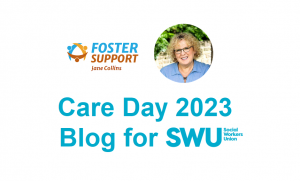SWU Blog: Care Day 2023 – Embracing therapeutic models and empathy

If you follow me on Twitter you will be aware of my very vocal opposition to some of the current ideology being actively promoted in education. The recently resigned Social Mobility Tzar and current government behaviour gurus would have teachers and policy makers believe that zero tolerance policies which include dystopian scenes of children marching single file down silent corridors, strict uniform rules with harsh exclusions as sanctions, humiliating treatment such as being excluded from trips or prom for attendance below 95% and isolation booths are the only way forward.
As a foster carer and a parent of a child with additional needs I know how damaging these policies are to children in care and SEND. I’m also a qualified teacher myself so I do have a good understanding of how disruptive behaviour can affect the whole class. However, as a trained and experienced facilitator, I also understand the theory behind therapeutic methods such as PACE, the three Rs, and the Solihull Approach. Having practiced these methods for over a decade, I also know that they work both in terms of behaviour de-escalation and improvements in self-regulation.
Self-awareness can help to de-escalate situations
During 2022 my company, FosterSupport, facilitated training to line managers and senior staff at John Lewis Partnership and Waitrose to support their care experienced employment program. A number of our staff collaborated and shared their ideas including foster carers, teachers, social workers, therapeutic support workers and care experienced young people. As a holistic team we imagined the specific working environment and visualised the type of triggers which may affect a care experienced partner. We then brainstormed through our collective knowledge and lived experience to develop an effective toolkit of knowledge and skills which would have the most impact given the time restriction of one hour for the session.
It was evident from the excellent feedback that these sessions led to genuine reflection and a willingness to learn. Delegates were surprised to learn about how our own individual triggers and ability to self-regulate our emotional state affect how we respond when someone is displaying challenging behaviour and how self-awareness can help to de-escalate situations. The sessions also gave them a great deal of insight into why their care experienced employees may, through no fault of their own, struggle with some situations and how they can support them.
Emotional states and challenging behaviour
I would invite you to think about a time when you felt immense grief, hurt, anger or fear and consider whether you were able to follow instructions or disciplinary requests calmly and rationally. Here’s mine:
My mum died on the evening of 8th December 2022. I was sat in the kitchen with my family when I found out. For the first time since the pandemic hit in early 2020 we were feeling festive and light hearted, then the phone rang. My brother told me that our mum had collapsed mid-sentence in the reception of her GP surgery, and they were trying to resuscitate her. I knew in that instant that she was gone.
Grief comes in waves and over the next few days I woke up crying each morning then tried to hold it together to get on with my day. I went to the local supermarket with my 18-year-old foster daughter where I was hit with an overwhelming wave of grief. The supermarket aisles contained so many precious memories of my mum, shopping together for birthdays and Christmas, buying toys and clothes for my children when they were small, and I felt lost.
We went to an empty self-service check out which had a handwritten “card only” sign stuck to it; however, it was actually broken. It looked as though other customers were about to leave their checkout, so we stood waiting for them to move. Then a member of staff came to tell me off for not waiting at the entrance. I pointed out that the “card only” sign implied that the checkout was working and if it wasn’t they should take that off and put an “out of order sign” on it instead. Then a customer using a checkout decided to interfere by stating, “You should have seen that it’s broken.”
Clearly, I hadn’t, or I wouldn’t have tried to use it. At this point I started to feel angry and indignant, and I stayed rooted to the spot waiting for an empty checkout; I just couldn’t bring myself to move and comply. I wanted to slump on the floor and sob that I’d just lost my mum and right there at that moment in a local supermarket I simply didn’t have the capacity to follow instructions and be subjected to criticism from a random stranger.
Right there in that moment I had a profound realisation.
I thought about all of my training and practice in therapeutic care and my absolute belief that zero tolerance rewards and consequences-based behaviour management simply cannot work for the majority of children growing up in care due to their early childhood experiences. At that moment I no longer just understood it, I felt it. I felt what it was like to be stuck, unable to comply with basic instructions and unable to tolerate even the most basic of criticism.
We have to be more empathetic
This is how children growing up in care often feel due to trauma, loss, grief, hyper vigilance and so many other emotions leading to dysregulation and heightened fight or flight responses.
As a society we must embrace empathy along with therapeutic models in schools, social work, foster care, health services and criminal justice. We cannot continue to demand more of children than we are capable of doing ourselves.
Once we grasp this real change is possible.